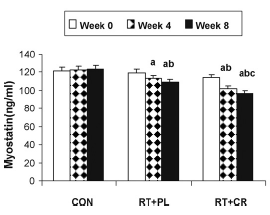|
Anabolic effect of blood pressure drug losartan due to myostatin inhibition
Sometimes people who use blood pressure drugs become a little fitter and stronger. Some - not all - blood pressure drugs seem to inhibit the break down of muscle tissue as well. Danish researchers, who studied the effect of blood pressure medication losartan on the muscles in healthy men, have found out the mechanism behind the muscle-strengthening effect of this drug: losartan is a myostatin inhibitor.
Losartan & muscles
Losartan lowers blood pressure by blocking the angiotensin II receptor type 1 [AT1R]. That receptor is, as the name implies, intended for angiotensin II, a blood pressure-increasing protein that the body itself produces.
In 2002, American researchers published a human study in The Lancet, in which losartan counteracted muscle loss in weakening elderly people. [Lancet. 2002 Mar 16;359(9310):926-30.] In that study, the researchers followed a group of older women for three years. During this period the maximal muscle strength that the women were able to develop on a leg-extension machine decreased by 4 kilos. If the women took losartan, this decrease was only 1 kilo. Other blood pressure drugs had no real effect on muscle strength.
Danish researchers, associated with the Institute of Sports Medicine Copenhagen, wanted to find out how losartan protects muscles from decay.
Study
The researchers divided 28 healthy men aged 64-90 into two groups. One group took 100 milligrams of losartan every day for three weeks. The other group received a placebo.
Just before the administration period began and halfway through, the men had to train their quads on a leg extension machine. Before and after that training session, the researchers took small amounts of muscle cells several times from the men's leg muscles - and studied them.
Results
In the days after the workout, the muscle fibers of the subjects recruited new cells. There were more of these new muscle cells in the losartan group than in the placebo group.

It was mainly the type-1 muscle fibers that responded to losartan.
In the men's muscle cells, the researchers looked at the activity of dozens of genes that control anabolic processes in muscles and tendons. Losartan had no effect on virtually any of these genes. The only exception was the gene for myostatin. That was partly deactivated by losartan.

This may explain the anabolic effect of losartan, the researchers think. Myostatin is a protein that slows down muscle growth.
Conclusion
"This is the first study to investigate the potential of blocking the AT1R to modulate the response of skeletal muscle to exercise in humans", the researchers wrote. "We found no influence of this medication on the response of satellite cells or on a broad panel of muscle and connective tissue-related genes. However, we did observe a greater suppression of myostatin with losartan ingestion, which, if confirmed, could have beneficial effects on aging muscle undergoing hypertrophy in response to heavy resistance trainings."
Source:
Med Sci Sports Exerc. 2018 Feb;50(2):225-35.
More:
One dose of myostatin inhibitor bimagrumab results in permanent muscle mass increase 28.11.2017
Fortetropin, the myostatin inhibitor in MYO-X 22.05.2017
The unusual anabolic effect of Ajuga turkestanica 31.03.2015
Archives:
Unusual Muscle Building Strategies
Myostatin Inhibitors
|






